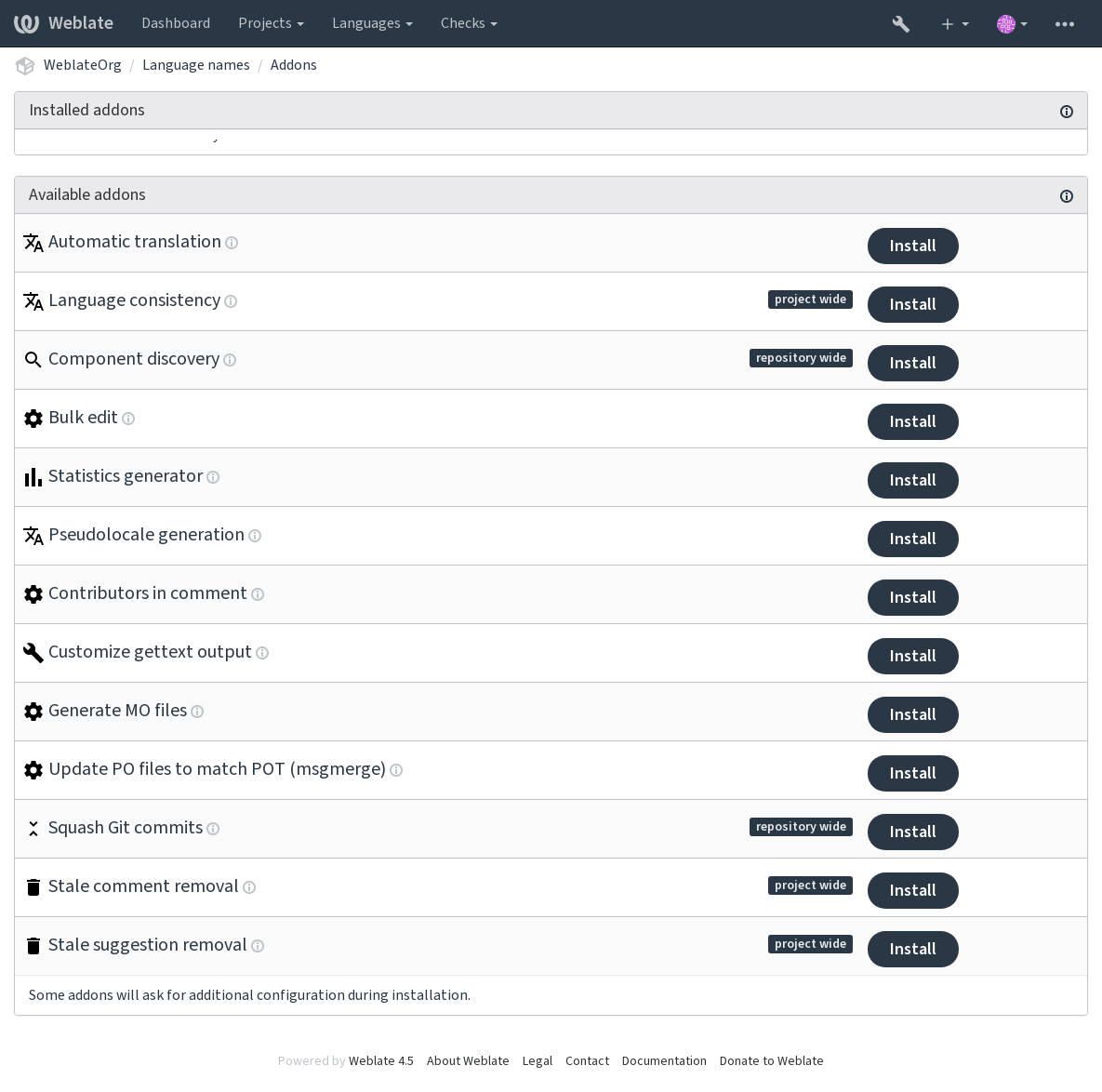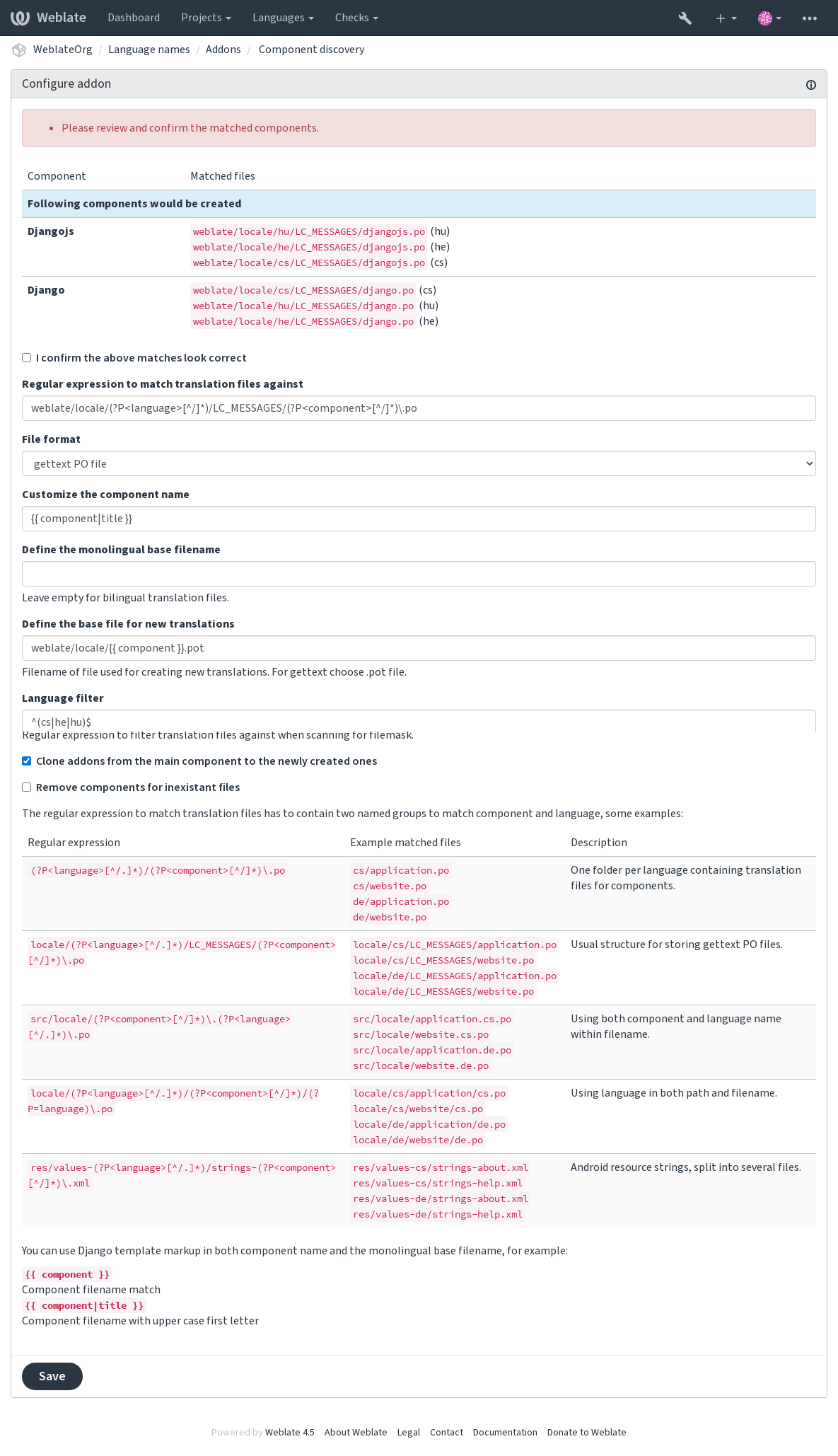Addons¶
New in version 2.19.
Addons provide ways to customize and automate the translation workflow. Admins can add and mangage addons from the Manage ↓ Addons menu of each respective translation component.

Built-in addons¶
Automatic translation¶
New in version 3.9.
Automatically translates strings using machine translation or other components.
Triggered automatically when new strings appear in a component.
JavaScript localization CDN¶
New in version 4.2.
Publishes translations into content delivery network for use in JavaScript or HTML localization.
Can be used to localize static HTML pages, or to load localization in the JavaScript code.
Generates a unique URL for your component you can include in HTML pages to localize them. See Translating HTML and JavaScript using Weblate CDN for more details.
Remove blank strings¶
New in version 4.4.
Removes strings without a translation from translation files.
Use this to not have any empty strings in translation files (for example if your localization library displays them as missing instead of falling back to the source string).
Cleanup translation files¶
Update all translation files to match the monolingual base file. For most file formats, this means removing stale translation keys no longer present in the base file.
Language consistency¶
Ensures all components within a project have translations for every added translated language by creating empty translations in languages that have unadded components.
Missing languages are checked once every 24 hours, and when new languages are added in Weblate.
Unlike most others, this addon affects the whole project.
Hint
Auto-translate the newly added strings with Automatic translation.
Component discovery¶
Automatically adds or removes project components based on file changes in the version control system.
Triggered each time the VCS is updated, and otherwise similar to
the import_project management command. This way you can track
multiple translation components within one VCS.
The matching is done using regular expressions enabling complex configuration, but some knowledge is required to do so. Some examples for common use cases can be found in the addon help section.
Once you hit Save, a preview of matching components will be presented, from where you can check whether the configuration actually matches your needs:

Hint
Component discovery addon uses Weblate internal URLs. It’s a convenient way to share
VCS setup between multiple components. Linked components use the local repository of
the main component set up by filling weblate://project/main-component
into the Source code repository field (in Manage ↓ Settings ↓
Version control system) of each respective component.
This saves time with configuration and system resources too.
See also
Bulk edit¶
New in version 3.11.
Bulk edit flags, labels, or states of strings.
Automate labeling by starting out with the search query NOT has:label
and add labels till all strings have all required labels.
Other automated operations for Weblate metadata can also be done.
Examples:
Search query |
|
|---|---|
Labels to add |
recent |
Search query |
|
|---|---|
Translation flags to add |
|
Flag unchanged translations as «Needs editing»¶
New in version 3.1.
Whenever a new translatable string is imported from the VCS and it matches a source string, it is flagged as needing editing in Weblate. Especially useful for file formats that include source strings for untranslated strings.
Hint
You might also want to tighthen the Unchanged translation check by adding
strict-same flag to Translation flags.
See also
Flag new source strings as «Needs editing»¶
Whenever a new source string is imported from the VCS, it is flagged as needing editing in Weblate. This way you can easily filter and edit source strings written by the developers.
See also
Flag new translations as «Needs editing»¶
Whenever a new translatable string is imported from the VCS, it is flagged as needing editing in Weblate. This way you can easily filter and edit translations created by the developers.
See also
Statistics generator¶
Generates a file containing detailed info about the translation status.
You can use a Django template in both filename and content, see Template markup for a detailed markup description.
For example generating a summary file for each translation:
- Name of generated file
locale/{{ language_code }}.json- Content
{ "language": "{{ language_code }}", "strings": "{{ stats.all }}", "translated": "{{ stats.translated }}", "last_changed": "{{ stats.last_changed }}", "last_author": "{{ stats.last_author }}", }
See also
Pseudolocale generation¶
Generates a translation by adding prefix and suffix to source strings automatically.
Pseudolocales are useful to find strings that are not prepared for localization. This is done by altering all translatable source strings to make it easy to spot unaltered strings when running the application in the pseudolocale language.
Finding strings whose localized counterparts might not fit the layout is also possible.
Hint
You can use real languages for testing, but there are dedicated pseudolocales available in Weblate - en_XA and ar_XB.
Contributors in comment¶
Updates the comment part of the PO file header to include contributor names and years of contributions.
The PO file header will look like this:
# Michal Čihař <michal@cihar.com>, 2012, 2018, 2019, 2020.
# Pavel Borecki <pavel@example.com>, 2018, 2019.
# Filip Hron <filip@example.com>, 2018, 2019.
# anonymous <noreply@weblate.org>, 2019.
Update ALL_LINGUAS variable in the «configure» file¶
Updates the ALL_LINGUAS variable in configure, configure.in or any
configure.ac files, when a new translation is added.
Customize gettext output¶
Allows customization of gettext output behavior, for example line wrapping.
It offers the following options:
Wrap lines at 77 characters and at newlines
Only wrap lines at newlines
No line wrapping
Note
By default gettext wraps lines at 77 characters and at newlines.
With the --no-wrap parameter, wrapping is only done at newlines.
Update LINGUAS file¶
Updates the LINGUAS file when a new translation is added.
Generate MO files¶
Automatically generates a MO file for every changed PO file.
The location of the generated MO file can be customized and the field for it uses Template markup.
Update PO files to match POT (msgmerge)¶
Updates all PO files (as configured by File mask) to match the POT file (as configured by Template for new translations) using msgmerge.
Triggered whenever new changes are pulled from the upstream repository. Most msgmerge command-line options can be set up through the addon configuration.
Squash Git commits¶
Squash Git commits prior to pushing changes.
Git commits can be squashed prior to pushing changes in one of the following modes:
New in version 3.4.
All commits into one
Per language
Per file
New in version 3.5.
Per author
Original commit messages are kept, but authorship is lost unless Per author is selected, or the commit message is customized to include it.
New in version 4.1.
The original commit messages can optionally be overridden with a custom commit message.
Trailers (commit lines like Co-authored-by: …) can optionally be removed
from the original commit messages and appended to the end of the squashed
commit message. This also generates proper Co-authored-by: credit for every
translator.
Customize JSON output¶
Allows adjusting JSON output behavior, for example indentation or sorting.
Formats the Java properties file¶
Sorts the Java properties file.
Stale comment removal¶
New in version 3.7.
Set a timeframe for removal of comments.
This can be useful to remove old comments which might have become outdated. Use with care as comments getting old does not mean they have lost their importance.
Stale suggestion removal¶
New in version 3.7.
Set a timeframe for removal of suggestions.
Can be very useful in connection with suggestion voting (see Peer review) to remove suggestions which don’t receive enough positive votes in a given timeframe.
Update RESX files¶
New in version 3.9.
Update all translation files to match the monolingual upstream base file. Unused strings are removed, and new ones added as copies of the source string.
Hint
Use Cleanup translation files if you only want to remove stale translation keys.
Customize YAML output¶
New in version 3.10.2.
Allows adjusting YAML output behavior, for example line-length or newlines.
Customizing list of addons¶
The list of addons is configured by WEBLATE_ADDONS.
To add another addon, simply include the absolute class name in this setting.
Writing addon¶
You can write your own addons too, create a subclass of
weblate.addons.base.BaseAddon to define the addon metadata, and
then implement a callback to do the processing.
See also
Executing scripts from addon¶
Addons can also be used to execute external scripts. This used to be integrated in Weblate, but now you have to write some code to wrap your script with an addon.
#
# Copyright © 2012 - 2021 Michal Čihař <michal@cihar.com>
#
# This file is part of Weblate <https://weblate.org/>
#
# This program is free software: you can redistribute it and/or modify
# it under the terms of the GNU General Public License as published by
# the Free Software Foundation, either version 3 of the License, or
# (at your option) any later version.
#
# This program is distributed in the hope that it will be useful,
# but WITHOUT ANY WARRANTY; without even the implied warranty of
# MERCHANTABILITY or FITNESS FOR A PARTICULAR PURPOSE. See the
# GNU General Public License for more details.
#
# You should have received a copy of the GNU General Public License
# along with this program. If not, see <https://www.gnu.org/licenses/>.
#
"""Example pre commit script."""
from django.utils.translation import gettext_lazy as _
from weblate.addons.events import EVENT_PRE_COMMIT
from weblate.addons.scripts import BaseScriptAddon
class ExamplePreAddon(BaseScriptAddon):
# Event used to trigger the script
events = (EVENT_PRE_COMMIT,)
# Name of the addon, has to be unique
name = "weblate.example.pre"
# Verbose name and long descrption
verbose = _("Execute script before commit")
description = _("This addon executes a script.")
# Script to execute
script = "/bin/true"
# File to add in commit (for pre commit event)
# does not have to be set
add_file = "po/{{ language_code }}.po"
For installation instructions see Custom quality checks, addons and auto-fixes.
The script is executed with the current directory set to the root of the VCS repository for any given component.
Additionally, the following environment variables are available:
-
WL_VCS¶ Version control system used.
-
WL_REPO¶ Upstream repository URL.
-
WL_PATH¶ Absolute path to VCS repository.
-
WL_BRANCH¶ New in version 2.11.
Repository branch configured in the current component.
-
WL_FILEMASK¶ Filemask for current component.
-
WL_TEMPLATE¶ Filename of template for monolingual translations (can be empty).
-
WL_NEW_BASE¶ New in version 2.14.
Filename of the file used for creating new translations (can be empty).
-
WL_FILE_FORMAT¶ File format used in current component.
-
WL_LANGUAGE¶ Language of currently processed translation (not available for component-level hooks).
-
WL_PREVIOUS_HEAD¶ Previous HEAD after update (only available after running the post-update hook).
-
WL_COMPONENT_SLUG¶ New in version 3.9.
Component slug used to construct URL.
-
WL_PROJECT_SLUG¶ New in version 3.9.
Project slug used to construct URL.
-
WL_COMPONENT_NAME¶ New in version 3.9.
Component name.
-
WL_PROJECT_NAME¶ New in version 3.9.
Project name.
-
WL_COMPONENT_URL¶ New in version 3.9.
Component URL.
-
WL_ENGAGE_URL¶ New in version 3.9.
Project engage URL.
See also
Post-update repository processing¶
Can be used to update translation files when the VCS upstream source changes. To achieve this, please remember Weblate only sees files committed to the VCS, so you need to commit changes as a part of the script.
For example with Gulp you can do it using following code:
#! /bin/sh
gulp --gulpfile gulp-i18n-extract.js
git commit -m 'Update source strings' src/languages/en.lang.json
Pre-commit processing of translations¶
Use the commit script to automatically change a translation before it is committed to the repository.
It is passed as a single parameter consisting of the filename of a current translation.